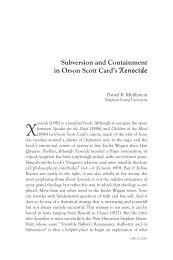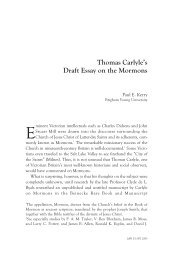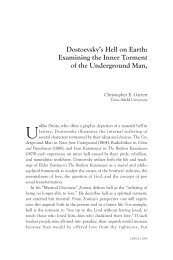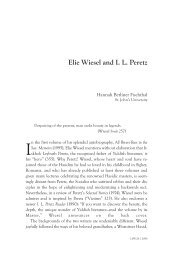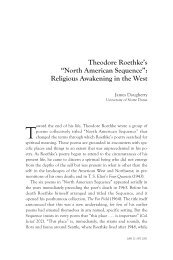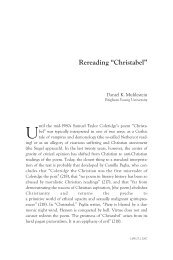Bret Harte, Unitarianism, and the Efficacy of Western Humor
Bret Harte, Unitarianism, and the Efficacy of Western Humor
Bret Harte, Unitarianism, and the Efficacy of Western Humor
Create successful ePaper yourself
Turn your PDF publications into a flip-book with our unique Google optimized e-Paper software.
Scharnhorst: <strong>Harte</strong> <strong>and</strong> <strong>Western</strong> <strong>Humor</strong> / 99<br />
ago adopted for his guidance,” <strong>and</strong> discovered “that he had omitted<br />
<strong>the</strong> final feast <strong>of</strong> reconciliation.” He tells his supposed son to “invite<br />
everybody” to <strong>the</strong> party—“everybody who knows that I brought you out<br />
<strong>of</strong> <strong>the</strong> wine-husks <strong>of</strong> iniquity, <strong>and</strong> <strong>the</strong> company <strong>of</strong> harlots; <strong>and</strong> bid<br />
<strong>the</strong>m eat, drink, <strong>and</strong> be merry” (126). During <strong>the</strong> feast, however, <strong>the</strong><br />
real Charles Thompson—“a man, shabbily dressed, <strong>and</strong> evidently in<br />
liquor” (129–30)—suddenly breaks into <strong>the</strong> room. The false prodigal<br />
begs <strong>the</strong> elder Thompson’s forgiveness—“thanks to your kindness, I<br />
now see <strong>the</strong> way by which an honest livelihood is gained”—but Mr.<br />
Thompson refuses to shake his h<strong>and</strong>. The tale ends on a pa<strong>the</strong>tic note,<br />
with <strong>the</strong> true prodigal son still steeped in iniquity, in a drunken stupor<br />
passed out on <strong>the</strong> couch, <strong>and</strong> Thompson estranged “forever” from <strong>the</strong><br />
man he had thought his son (133). Whereas Christ’s parable celebrates<br />
a fa<strong>the</strong>r’s unconditional love for his son who “was dead <strong>and</strong> is alive<br />
again,” <strong>Harte</strong> indicts Thompson for his religious bigotry <strong>and</strong> selfishness.<br />
<strong>Harte</strong>’s tale “Miggles” (June 1869), <strong>of</strong>ten read as a feminist allegory,<br />
also takes <strong>of</strong>f from a biblical source: <strong>the</strong> character <strong>of</strong> Mary Magdalene.<br />
The narrator <strong>of</strong> this story, in company with <strong>the</strong> driver <strong>and</strong> six o<strong>the</strong>r<br />
passengers aboard a stagecoach, is forced by inclement wea<strong>the</strong>r to<br />
spend a night in <strong>the</strong> cabin where Miggles lives with an “imbecile paralytic”<br />
named Jim or James, according to legend <strong>the</strong> name <strong>of</strong> Jesus’<br />
bro<strong>the</strong>r. The invalid is obviously dying <strong>of</strong> venereal disease. Six years<br />
earlier, when she ran <strong>the</strong> Polka Saloon in Marysville, he “used to<br />
know me,” Miggles explains: “Everybody knew me <strong>the</strong>re, <strong>and</strong> everybody<br />
had <strong>the</strong> right to know me” (50). When Jim fell ill <strong>and</strong> <strong>the</strong> doctors<br />
said “that he would never get better, <strong>and</strong> couldn’t last long<br />
anyway,” <strong>the</strong>y advised her to “send him to <strong>the</strong> hospital, for he was no<br />
good to anyone <strong>and</strong> would be a baby all his life” (51). Instead, Miggles<br />
sold her business <strong>and</strong> bought a ranch where she could nurse Jim until<br />
his death. “Perhaps I’ve changed some,” she confesses. Then <strong>the</strong> narrator<br />
adds:<br />
With a woman’s intuitive tact <strong>and</strong> poetry she had, as she spoke,<br />
slowly shifted her position so as to bring <strong>the</strong> mute figure <strong>of</strong> <strong>the</strong> ru-



